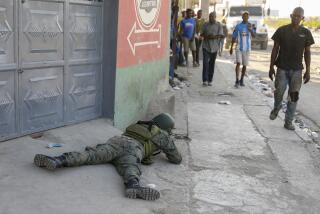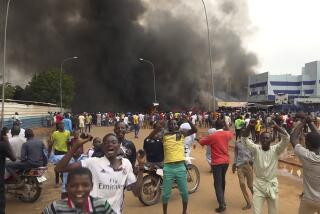Indonesian Political Situation Remains Unsettled
- Share via
Asia
Indonesia: An international peace force last week began trying to restore order to East Timor after weeks of violence that left much of Dili, the provincial capital, in ruins. Earlier this month, the State Department said the political fallout from East Timor has made all of Indonesia a country where travelers should exercise caution. Most important, those Americans remaining in East Timor should leave immediately, because much of the violence by pro-independence militiamen was intended to intimidate foreigners and force them out. Also of note:
* Demonstrations, some turning violent, are frequent in Jakarta, the national capital. The political situation remains unsettled throughout the sprawling archipelago nation, the State Department observed, and will likely remain so until after presidential elections at year’s end.
* Separatist movements have sometimes resulted in violence in the Aceh and Irian Jaya regions, and Americans are especially urged to avoid Aceh.
* As before, the resort island of Bali has remained largely untouched by the recent trouble.
Middle East
Israel: Twin car bombs exploded in two northern Israeli cities earlier this month, both attributed to radical Palestinian elements intent on undermining the recently signed Israeli-Palestinian peace accord. The blasts--in a parking lot in the Mediterranean port of Haifa and in the center of Tiberias, on the Sea of Galilee--left three people dead, probably the bombers, and wounded several passersby.
Meanwhile, Israeli and Palestinian officials said they will work together to ease travel between Jerusalem and Bethlehem for the expected mass of millennium visitors. The Israeli army operates a fortified checkpoint on the road to Bethlehem, which is under Palestinian self-rule. Some officials have expressed fears of massive traffic jams caused by foreign tourists and pilgrims arriving throughout next year to celebrate Jesus’ 2,000th birthday.
Russia
A series of three bombings in Moscow over a two-week period left more than 200 people dead and signaled a new terrorist campaign. Russian officials attributed the attacks to Islamic rebels who are battling Russian troops in the Dagestan region.
Authorities tightened immigration procedures, and thousands of police in Moscow and other cities began checking ID papers of people from the Caucasian republics and others with darker complexions than most Russians. In the worst incident, a bomb demolished an eight-story apartment building Sept. 13, killing at least 118 people. The wave of attacks began Aug. 31 when a bomb exploded in a crowded Western-style shopping mall near the Kremlin, killing one person and injuring dozens. As of press time, no foreigners had been reported killed or injured in any of the bombings.
Briefly . . .
Ecuador: Eight oil workers, one of them an American, and four European tourists were kidnapped on the same day earlier this month by about two dozen gunmen in Ecuador’s eastern jungle near the Colombian border. The tourists, a Belgian and three Spaniards, were on their way to visit an ecological reserve. . . . Iran: An Italian and three Spaniards, including a 67-year-old priest, were released unharmed two weeks after being kidnapped by drug traffickers in the southeastern city of Kerman. Their captors reportedly sought the release of two comrades from jail, but it was not known if any demands were met. . . . Peru: Hundreds of visitors to the Andean ruins of Machu Picchu were temporarily stranded at hotels near the site late last month as protesters blocked tourist trains from leaving the city of Cuzco, 70 miles away. Some of the tourists were ferried down to Cuzco by private helicopter. About 200 workers, fearing job losses, were protesting the privatization of the railway concession to Machu Picchu.
Hot spots: Because of the destruction caused by Hurricane Floyd in the Bahamas and the earthquake in Taiwan, the State Department posted a short-term travel warning for those two countries. Other places considered risky are Afghanistan, Albania, Algeria, Angola, Bosnia-Herzegovina, Burundi, Central African Republic, Colombia, Congo, Eritrea, Ethiopia, Guinea-Bissau, Iran, Iraq, Lebanon, Liberia, Libya, Nigeria, Pakistan, Republic of Congo (Brazzaville), Rwanda, Serbia and Montenegro, Sierra Leone, Somalia, Sudan, Tajikistan and Yemen.
The U.S. State Department offers recorded travel warnings and advisories at (202) 647-5225; the fax line is (202) 647-3000. Internet address is https://travel.state.gov.
More to Read
Sign up for Essential California
The most important California stories and recommendations in your inbox every morning.
You may occasionally receive promotional content from the Los Angeles Times.










